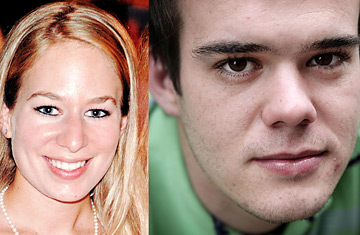
American teenager Natalee Holloway (left); Dutch student Joran Van der Sloot (right)
It was trial by television last weekend as literally half the population of the Netherlands tuned in to watch a bizarre twist in the unsolved case of Natalee Holloway, an 18-year-old American who went missing in May 2005 after a night out on the Caribbean island of Aruba. Acting as the prosecution: Peter de Vries, a Dutch crime journalist, who presented his eagerly awaited take on the case on a Dutch commercial television station. The advocate for the defense: a rival channel, which aired an interview with one of the prime suspects in the case. Left in the dust as hapless bystanders were the official prosecutors in Aruba, who have failed to bring anyone to trial almost three years since Holloway was last seen leaving a nightclub with Joran van der Sloot and two friends on the night of May 29, 2005.
The case revolves around Van der Sloot, 20, a Dutch student who was then living in Aruba, a self-governing part of the Kingdom of the Netherlands. He was arrested several times for alleged involvement in Holloway's disappearance, but prosecutors were never able to build a case against him. De Vries, working outside official channels, aired his own case, fashioned around repeated taped confessions weaseled out of Van der Sloot by Patrick van der Eem, a friend he met in 2007.
De Vries says he was approached by Van der Eem with an offer to try to find Van der Sloot out. They videotaped a number of conversations Van der Eem had in his car with Van der Sloot, in which the latter tells how Holloway collapsed while the two were making out on the beach. "We were at the beach and suddenly she did nothing," Van der Sloot said on the tape that De Vries aired. "I tried everything, I shook her, but nothing." He said he then called a friend, named Daury, who dumped the body at sea by boat. Asked by Van der Eem how he could be so sure that Holloway was dead, Van der Sloot admitted that he couldn't be.
Yet even before these alleged confessions were aired, Van der Sloot dismissed them as lies. "I just told Van der Eem what he wanted to hear," Van der Sloot said in an interview on Friday on television. A person who identified himself as the said Daury dismissed them on Monday in the newspaper DAG. He denounces the story and says he was in the Netherlands at the time.
Whatever the value of the confessions, they clearly took the prosectors' office on Aruba by surprise. Officials there have taken some flak for letting De Vries steal the show, but obstruction of justice is not as clear a concept in Dutch law as it is in many other countries. Withholding information relevant to an investigation is not by definition punishable, a spokesperson for the Dutch prosecutor's office confirmed.
De Vries showed chief Aruban prosecutor Hans Mos some of the video material beforehand. Apparently acting on these leads, Mos reopened the case last Friday. So far, no arrest has been made, nor has the prosecutor's office given an official statement on the developments. Interviewed in De Vries' show, Mos deemed the taped confessions "convincing," but urged caution in taking the case to court. "This calls for additional research and that is what we are going to do," he said.
Hugely complicating that research is the question of what crime the alleged facts would actually constitute. If Holloway indeed died, but was not murdered, on that beach, Van der Sloot and any co-accused could still be held accountable for illegally disposing of the body, which is a relatively minor crime under Dutch law. But if there is a possibility she was still alive, it might be any degree of manslaughter, experts say.
Sunday night's show will be aired on American network ABC this week. De Vries will also tour various channels (De Vries says he is scheduled to appear on Larry King Live) to comment on the case. But after a weekend full of televised revelations, the jury is still out.
